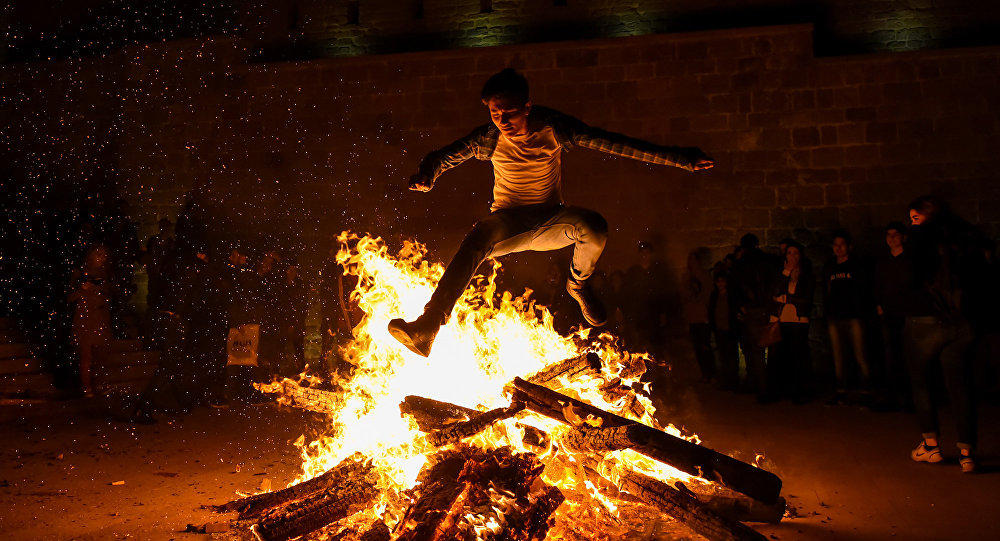Yet, the traditions of Nowruz are older than all of modern society and extend into the ancient past of the Caucasus. Nowruz’s earliest traditions came from the most sacred holiday of the Zoroastrian religion.
Over time, and with the coming of first Islam and then secularism in the region, the traditions of Nowruz have changed significantly and are no longer defined exclusively by their roots in the “fire-worship” religion.
“Novruz is also a holy day for Sufis, Ismailis, Alawites, Babis, and adherents of the Baha’i faith,” writes “The Real Azerbaijan” author, noting how sacred significance in ancient Novruz traditions has crossed lines of religious affiliation.
In the book “The Real Azerbaijan” the Novruz holiday is described as that which “marks the first day of spring and the beginning of the year in the Iranian calendar.” The book describes that the festival is celebrated “the moment the Sun crosses the celestial equator and equalizes night and day” which has been recorded to the fine “t” since ancient times and shaped the tradition of Novruz by both those races who emerged out of what is modern Iran. Novruz is a national holiday of Azerbaijan, which bears its name from the ancient presence of Zoroastrians. The word “Azerbaijan” means “land of sacred fire” in the ancient local dialects. The word has been translated from the Persian word azer meaning “fire” by modern linguistics.The Women’s Roundtable also met up with former U.S. State Department staffer and activist against antisemitism Ellie Cohanim. Cohanim explains the targeting and human rights abuses in Iran, as well as the lingering and struggling demographic of Iranian Jews.
Despite the association to Persian dialects, Azerbaijan is predominantly Turkic in ethnic origin and the Azerbaijani language is a primarily Turkic dialect. The Persian word for “fire” became associated with Azerbaijan in part because of the religious presence of Zoroastrians, and in part, citing the works of Thomas Reiss about Kurban Said, because of the nation’s natural oil deposits, which have in the past caused landmarks to burst into flame from natural causes.
The book “the Real Azerbaijan” states that the Novruz holiday is believed to have been created by Zoroaster himself. Zoroaster was the prophet of the religion that bears his name, which predates Judaism, Christianity, and Islam.
The book describes how, since the Achaemenid era, the new year begins with the New Day, when the heavens are equal. It is worthy of note that there are some politicized discrepancies to this explanation of the holiday. The ancient and Middle Ages calendar of Iran was heavily influenced by the presence of Azerbaijani in Iran before the Islamic revolution. The Azerbaijani of Iran is referred to today as “the Southern Azerbaijani” and resides in what is now Tabriz, Iran. Tabriz was the capital region of Shah Ismayil’s Iran. So, while Novruz as an Azerbaijani tradition shares the same calendar as the Iranian calendar, Iran is composed of multiple ethnicities, including Azerbaijanis, Persians, Ahwazi Arabs, and Jews.
“It is celebrated on the day of the astronomical Northward equinox, which usually occurs on March 21,” the book continues. In truth, many of the aspects of the cultural connection with fire are seen in Novruz. Every year, a great pyre is lit, and traditional dancers perform.
Today, there are an estimated fewer than 200,000 Zoroastrians. Most of them live in India, and faith-keepers are part of an ethnic group called Parsis. However, Azerbaijan and Turkmenistan are likewise believed to have a tiny demographic from this ancient religion.
The author of the book “Ghost Train to the Eastern Star” Paul Theroux noted that Zoroastrian traditions continued in the region “despite being heresies” in more traditional times. This account in this book of the life of Zarathustra, a.k.a. Zoroaster, recalls how the ancient mystic “flourished and was persecuted” 3,500 years ago. This account in this book of the life of Zarathustra, a.k.a. Zoroaster, recalls how the ancient mystic “flourished and was persecuted” 3,500 years ago. Zarathustra was described in this account to have resided in the regions that are now known as Afghanistan and Iran, yet his tradition has left its remnants on the Land of Fire. Zarathustra believed in equality of sexes and denounced both the establishment of a priesthood due to corruptibility and the use of the name of God for power.
Due to his mystic regard for light and fire, springtime and sunshine are core elemental virtues of his faith. Sunlight is an elemental aspect of Novruz as it was celebrated religiously. The religious roots of Novruz have been condemned in some nations across the Muslim world as “pagan” as some aspects, such as the painted eggs which represented fertility in Zoroastrianism, are considered pagan by the purists of Abrahamic religions. Azerbaijan has adopted the holiday in part due to its secularized society and in part due to the adopted spirituality of the festival.
Local politicization of ethnicity and culture over the last century of human history has led to some disagreements in academics over the origins of Novruz, or the association with Zarathustra. As Azerbaijan endures as a nation, Novruz is expected to adapt to the “new day” of modernity, with contemporary events further contributing to the shape of this ancient spring tradition.










